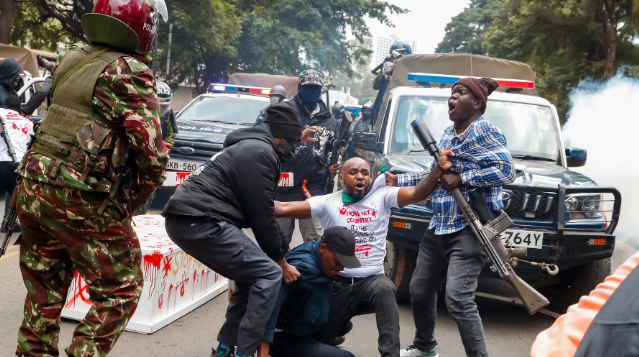Renowned Kenyan activist Boniface Mwangi has bravely opened up about a harrowing period in his life when he contemplated suicide. Driven to despair by relentless harassment and the government’s violent crackdown on peaceful protests, Mwangi found himself on the brink of despair.
In a candid social media post, Mwangi revealed that on August 3, 2024, he felt so overwhelmed by the pain, grief, and trauma he had endured that he considered taking his own life. However, the unwavering love and support of his family and friends prevented him from carrying out his tragic plan.
Mwangi expressed deep concern over the deteriorating political situation in Kenya, condemning the government’s use of excessive force against peaceful demonstrators. He criticized President William Ruto for labeling protesters as “treasonous” and deploying the military to quell the unrest, resulting in numerous casualties and disappearances.
The activist’s unwavering commitment to social justice has come at a great personal cost. His family lives in constant fear of his abduction or murder, and he has faced numerous threats and arrests. Despite the risks, Mwangi remains resolute in his fight for a better Kenya.
Mwangi’s story serves as a stark reminder of the immense pressure faced by activists and the devastating impact of political violence. His courage in sharing his personal struggles is a testament to his resilience and unwavering commitment to social justice.
Read also; Boniface Mwangi’s Solo Midnight Protest at JKIA Demanding ‘Ruto Must Go’
Boniface Mwangi- The price to pay as an activist
In relation to the latter, Boniface Mwangi shed light on the dangers and challenges faced by those who dare to speak out against injustice. Mwangi previously detailed the relentless harassment, intimidation, and threats he has endured throughout his career as a human rights defender.
Read also; Boniface Mwangi spotted for the first time after deactivating his social media (Photo)
Mwangi’s experiences are not isolated. He highlighted the numerous arrests, abductions, and disappearances of fellow activists who have been targeted for their involvement in peaceful protests. The government’s crackdown on dissent has created a climate of fear and intimidation, forcing many to live underground or flee the country.
Despite the risks, Mwangi remains resolute in his fight for a just and equitable society. He has witnessed firsthand the devastating consequences of political violence, including mass killings and disappearances. Yet, his determination to hold perpetrators accountable and create a better future for Kenya remains undeterred.
Mwangi’s story is a stark reminder of the sacrifices made by those who stand up for human rights. His courage and resilience serve as an inspiration to others who may be hesitant to speak out against injustice.
